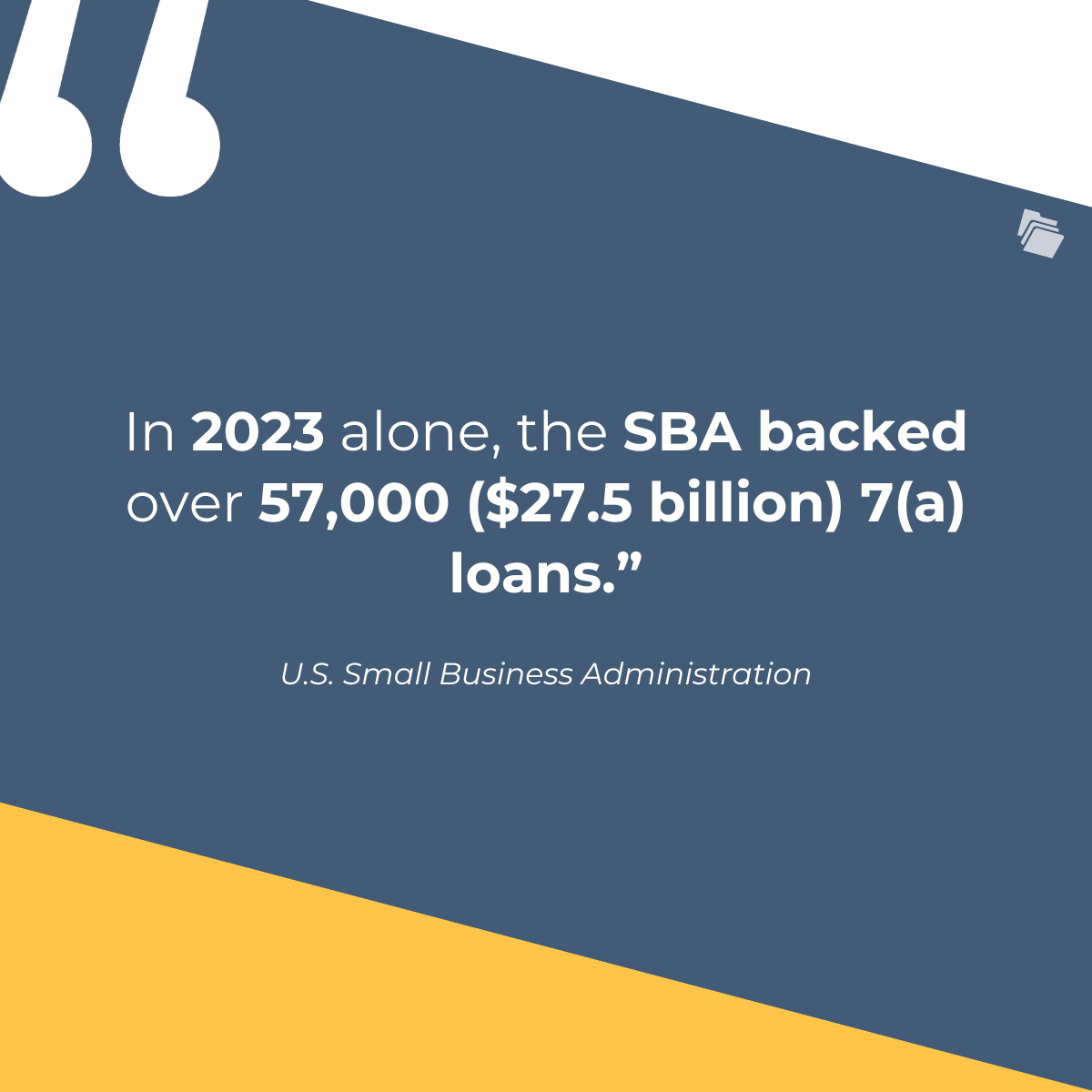When a business needs funding to purchase real estate, it could use a commercial real estate loan.
A commercial real estate loan gives businesses access to convenient funds that allow them to scale up their operation, but not all real estate loans are alike. Businesses should consider several factors, such as individual lenders’ specific terms, industry- or geography-specific loan programs, and acceptable uses of funds. By the end of the year, the commercial real estate market is projected to reach a total value of $118.8 trillion, and in 2024 businesses have more options than ever for how they can obtain their piece of the pie.
In this guide, you’ll learn everything you need to know about commercial real estate loans, including how they work, what different types of loans and lenders may be available to your business, and how you can go about actually obtaining a loan yourself.

The Basics of Commercial Real Estate Loans
Commercial real estate loans help businesses across (nearly) every industry purchase real estate and land that they can then use for things like buildings, parking lots, improvements, and more.
Many different types of businesses may obtain a commercial real estate loan, such as:
- Office buildings
- Manufacturing warehouses
- Retail stores
- Restaurants
- Housing and hotels
While businesses in every industry can generally be eligible for a commercial loan, businesses may face limitations in the approved use of their funds.
For instance, the most obvious limitation of a commercial real estate loan is the funds must be spent on buying or improving real estate, not to pay for other types of expenses. Another limitation is that funds must be spent on real estate that will be used for business purposes. While businesses frequently purchase real estate not for use, but as an investment, and are frequently funded by loans, these types of investment property loans are different from the typical commercial real estate loan.
This also means businesses can’t use commercial real estate loans to purchase real estate for personal use (such as the owner’s house). Ultimately, the requirements of the loan depend on the individual loan program, lender, and borrower, but as a general rule of thumb, at least 51% of the purchased real estate must be owner-occupied, meaning the business physically occupies over half the square footage of the building.
However, businesses typically can use the funds from a commercial real estate loan to purchase land to construct or develop a commercial building.
Choosing the Right Commercial Real Estate Loan
Small businesses generate 44% of U.S. economic activity, employ 46% of U.S. workers, and comprise 99.9% of small businesses. The Small Business Administration (SBA) works with lenders and certified development companies (CDCs) to offer special loan programs tailored to the needs of small businesses.
However, businesses of every size should be aware of their options before choosing a type of commercial real estate loan. Here are some of the most common loan products for commercial real estate:
1. Traditional Commercial Mortgage
Similar to a personal residential mortgage, a traditional commercial mortgage holds the property as collateral for the loan. Commercial mortgages typically have shorter terms as well — usually 5-20 years as opposed to the common 10-30 year range for residential mortgages. Of the examples here, traditional commercial mortgages may be more difficult to get approved for because they pose a relatively greater risk to lenders than other loan products.
2. SBA 7(a) Loan
As previously mentioned, the Small Business Administration created several unique financial products just for small businesses. The primary loan through which they support small businesses is their 7(a) loan, a program that has a $5 million cap. Businesses can use funds from their 7(a) loan to purchase commercial real estate, but they can also use funds for a variety of purposes, making this one of the more flexible options on this list. In 2023 alone, the SBA backed over 57,000 ($27.5 billion) 7(a) loans.

3. SBA 504 Loan
In addition to their popular 7(a) program, the Small Business Administration also created 504 loans which use a unique lending structure to secure more favorable rates for businesses. In 504 loans, the lender only has to provide half the funding for the loans, while the other half is split 40/10 between a certified development company (CDC) and the borrower, in the form of their downpayment. While not as popular as the 7(a) program, the SBA still backed a considerable 5,900 504 loans worth $6.4 billion in 2023.
4. Conduit/CMBS Loans
A Commercial Mortgage-Backed Security (CMBS) loan (also called a “conduit” loan, but not to be confused with conduit financing) is similar to a collection of traditional commercial mortgages that are pooled into tranches to sell on the secondary market. CMBS loans have several advantages: they’re non-recourse (meaning if the borrower defaults on the loan, the lender can’t take control of the property), they’re fully assumable (meaning they can be bought and sold), and they’re offered at a fixed rate. However, CMBS loans are only available for income-generating properties.
5. Commercial Bridge Loans
Aptly named, bridge loans help businesses “bridge” gaps in funding by providing quick financing with a short repayment period. For convenience, businesses may pay a higher interest rate than the market rate, but for businesses in a pickle, a bridge loan can be just the right solution. Generally, the term of a bridge loan is between 6 months and 3 years, in contrast with the up to 20 years common for other loan programs.
6. Hard Money Loans
Similar to a commercial bridge loan, hard money loans can offer quick funding on a short repayment period. Unlike commercial bridge loans, hard money loans are funded by private investors and emphasize collateral — the “hard” in the name doesn’t refer to the difficulty in obtaining funds, but to the fact that the loan is backed by a tangible, “hard” asset.
7. Soft Money Loans
The counterpart to a hard money loan is unsurprisingly a soft money loan, so named because it’s secured by the creditworthiness of the borrower rather than a collateralized asset. However, like hard money loans, soft money loans are still funded by private investors rather than a traditional financial institution like a bank or credit union.
Depending on which type of commercial real estate loan you opt for, expect to pay 10-30% as a downpayment — 10% for SBA loans, but 30% or higher for private lenders who may require a lower loan-to-value ratio.
Obtaining a Commerical Real Estate Loan
With so many options to choose from, obtaining a loan may seem daunting, but it doesn’t have to be.
Once you’ve determined which loan program best suits your business’s needs, contact a lender to start the application process. They’ll tell you what paperwork and supporting documentation they require for their underwriting process.
Each loan program and lender comes with their own set of underwriting criteria and requirements, so there’s no one-size-fits-all checklist for this process, but your lender will typically ask for documents such as:
- Business financial statements and business plan
- Business and personal tax returns
- Information about how you will use your funds
- Permits, appraisals, inspections, etc. depending on the specifics of your situation
Gathering this documentation (which often includes confidential business information and personally identifiable information or PII) and submitting it to lenders can be a bottleneck in the loan application process, and can even delay closing, but once the lender has this documentation, they’ll make a credit decision, and if all goes according to plan, they’ll make you an offer which you can accept or negotiate.
FileInvite Makes Document Sharing Simple and Secure
In this guide, we’ve covered how commercial real estate loans work, what types of commercial real estate loans are available on the market, and how to obtain a loan of your own.
As we discussed, documentation can be a pain point in the application process and can significantly delay funding. Additionally, borrowers need to think about security risks and protect the sensitive information in their applications.
For lenders, a secure document sharing portal can alleviate the risk of a data breach and create a nexus for all document-gathering activities. Instead of having documents spread out over emails, faxes, physical mail, and other insecure methods, FileInvite allows lenders to consolidate all those streams of documents into one secure, centralized hub. Easy communication with more security is a win for borrowers and lenders alike.
FileInvite elegantly solves these problems with a secure document collection solution that makes gathering and transmitting documentation easy and safe.
To see FileInvite in action, request a free demo today.

Related Posts: